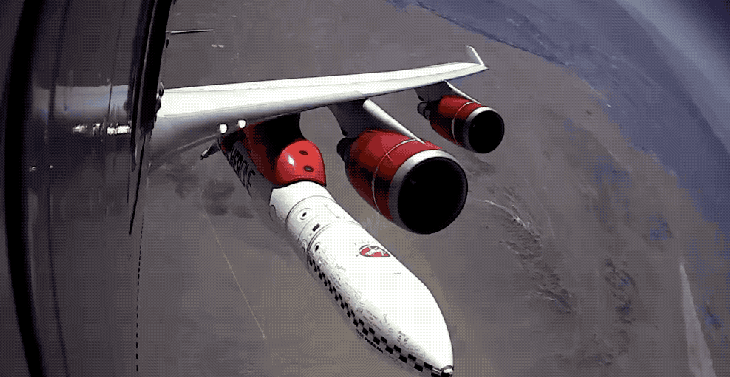Richard Branson-backed space startup Virgin Orbit has completed a key step along its path to launching satellites for commercial customers. The company held a successful “drop test” of its LauncherOne rocket, in which the crucial piece of its launch system was released in a free fall from its Boeing 747-based launch aircraft (nicknamed “Cosmic Girl”).
LauncherOne was released from a height of 35,000 feet, which is a typical cruising altitude for commercial aeroplanes, which is where it would be during an actual launch. Virgin Orbit’s model flies its rocket to this altitude before engaging the engine, which is a lot more energy and cost-efficient versus launching the rocket from the ground (which is what SpaceX does, for instance).
During this test, the LauncherOne rocket did not engage its engine (and in fact, it’s a full-scale dummy rocket rather than a real one) once it detached from the wing of the modified 747, which is what it would do if this was an actual launch. Instead, it fell 35,000 feet to the ground, where it impacted in a planned drop zone at Edward’s Air Force Base in the Mojave desert.
[gallery ids="1854242,1854237,1854238,1854240,1854241"]
All of this was to plan, as the main focus of this drop test was to study the separation of the rocket from the launch aircraft’s wing, and to gather a number of sensor readings about how the rocket behaves when it’s falling freely through the air.
Virgin Orbit is part of Virgin’s duo of space companies, which also includes Virgin Galactic (which announced its intention to become a publicly traded company earlier this week). Orbit’s specific focus is offering an affordable option for smallsat launches, a market where it’ll compete with Rocket Lab, which is using a more traditional ground-based rocket launch model.
Next up for Virgin Orbit is to build and assemble its first actual orbital test rocket, which it plans to launch into space later this year.
